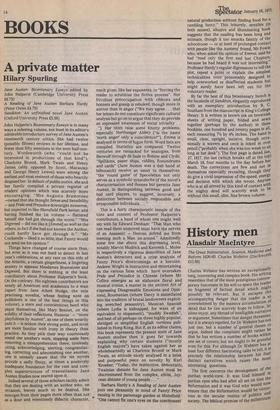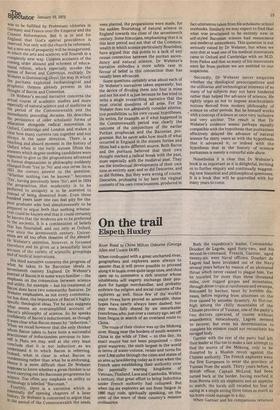History men
Alasdair Macintyre
The Great instauration. Science, Medicine and Reform 1626-60. Charles Webster (Duckworth £13.50) Charles Webster has written an exceptionally long, interesting and complex book. His writing resembles that of the most prestigious contemporary historians in his will to spare the reader no fragment of factual detail which Might. possibly be relevant. But it escapes the accompanying danger that the reader is so overwhelmed by the massive accumulation of detail that he dan scarcely hope to follow, !et alone enjoy, any thread of intelligible narrative or argument. Sometimes that danger threatens; but it is always repelled, for Dr Webster has not just one, but a number of general theses to argue. Indeed the complaint might rather be that he has written a number of books within one set of covers; but we ought to be grateful even for this. For although Dr Webster has at least four different fascinating tales to tell, it is precisely the relationship between his four distinct narratives which raises the most interesting questions. The first concerns the development of the puritan world-view. It was God himself in puritan eyes who had after all set on foot the Reformation and it was God who would now ensure that the Reformation would be victormus in the secular realms of politics and society. The biblical promise of the millenniunl was to be fulfilled by Protestant victories in Germany and France over the Emperor and the Counter Reformation. But it is in and for England that God's special providence is reserved. Not only will the church be reformed, but a new era of prosperity will be inaugurated, in which the arts and sciences will flourish in a 'completely new way. Utopian accounts of the coming order abound and schemes of educational reform, which especially invoke the names of Bacon and Comenius, multiply. Dr Webster is illuminating about the way in which the puritans exploited eschatological and Prophetic themes already present in the thought of Bacon and Comenius.
Dr Webster's second narrative concerns the actual course of academic studies and more especially of natural science and of medicine in the period of the Commonwealth and the immediately preceding decades. He describes the persistence of older scholastic forms of education alongside radical innovation in Oxford, Cambridge and London and makes it clear how many currents ran together and not always in the same direction. There is a touching and absurd moment in the history of Oxford when in the early sixteen fifties the answers which degree-seeking candidates were expected to give to the propositions advanced in formal disputations in philosophy suddenly changed from 'Yes' to 'No' and vice versa. So in 1651 the correct answer to the question: "Whether nothing can be known:" becomes 'Yes', having previously been 'No'; and in 1654 the proposition that modernity is to be preferred to antiquity is to be assented to instead of being dissented from. Even three .hundred years later one can feel pity for the Poor graduate who had simultaneously to be prepared to argue both that nothing whatsoever could be known arid that it could certainly be known that the moderns are to be preferred to the ancients. It is a combination of beliefs that has flourished, and not only at Oxford, ever since the seventeenth century. Universities are all too often theatres of the _absurd. ljr Webster's attention, however, is focussed elsewhere and he gives us a beautifully lucid account of the variety of scientific groupings and of medical innovations.
His third narrative concerns the progress of What he takes to be Baconian ideals in seventeenth century England. Dr Webster's Portrait of Bacon is in some ways familiar — the emphasis on the connection between science r,arld utility, for example — but his treatment of nacon does have two noteworthy features. Dr Webster emphasises, as not every commentator has done, the importance of Bacon's highly specific theological ideas. Yet he also suggests What seems an oversimplified account of Bacon's philosophy of science. So he speaks Confidently of Bacon's inductionism, as though It were clear what Bacon meant by "induction." When we recall however that the only thinker Whom Bacon takes to have been a successful Practitioner of inductionism previous to himself is Plato we may well at the very least conclude that it is not induction as we ,.understand it to which Bacon is referring. Indeed, what is clear is what Bacon is condemning rather than what he is endorsing. Hence it is more difficult than Dr Webster Supposes to know whether a given thinker is or is not carrying out the Baconian programme for . science. Too often any emphasis on utility or technology is labelled "Baconian." Fourthly, there is a narrative which is essentially the' opening chapters of a later history. Dr Webster is concerned to argue that in the period of the Commonwealth the seeds
were planted, the preparations were made, for the sudden flourishing of natural science in England towards the close of the seventeenth century. Some historians, emphasizing that it is this later period and not that of the Commonwealth in which science particularly flourishes, have argued that this points to a lack of any causal connection between the puritan ascendancy and _natural science. Dr Webster's narrative embodies a more subtle case in favour of belief in this connection than has usually been advanced.
Some questions certainly arise about each of Dr Webster's narratives taken separately; but the device of dividing them into four is mine and not his and it is just because he has tried to write a single overarching narrative that the most crucial questions of all arise. For Dr Webster does not adequately consider alternative possibilities to his own causal hypotheses. He writes, for example, as if what happened in the Commonwealth period was clearly the outcome of the conjuncture of the earlier Puritan prophecies and the Baconian programme. But he never asks how much of what occurred in England in the sixteen forties and fifties had a quite different source. Both Bacon and the puritans believed that their own thought marked a radical break with the past, more especially with the medieval past. They see the intellectual developments of their own time as entirely new; and so did Descartes, and so did Hobbes. But they were wrong of course. Descartes, professing to lay bare the virginal contents of his own consciousness, produced in
fact utterances taken from his scholastic school textbooks. Similarly we may expect to find that what was proclaimed to be entirely new in self-styled Baconian science had renascence and medieval antecedents. This question is not seriously raised by Dr Webster, but when we note that at least one of his medical innovators came to Oxford and Cambridge with an M.D. from Padua and that as many of his innovators were far from puritan we are entitled to our suspicions.
Secondly, Dr Webster never enquires whether the theological preoccupations and the utilitarian and technological interests of so many of his subjects may not have hindered rather than helped the advance of science. He rightly urges us not to impose anachronistic notions derived from modern philosophy of science on other periods. But he himself works with a concept of science at once very inclusive and very unclear. The result is that Dr Webster's evidence seems perhaps equally • compatible with the hypothesis that puritanism effectively delayed the advance of natural Science for thirty years as with the hypothesis that it advanced it; or indeed with the hypothesis that in the history of science puritanism is merely a colourful side-show.
Nonetheless it is clear that Dr Webster's book is as important as it is delightful, inciting us to further enquiry and continually suggesting new historical and philosophical questions. It is a book that will be quarrelled with for many years to come.



























 Previous page
Previous page